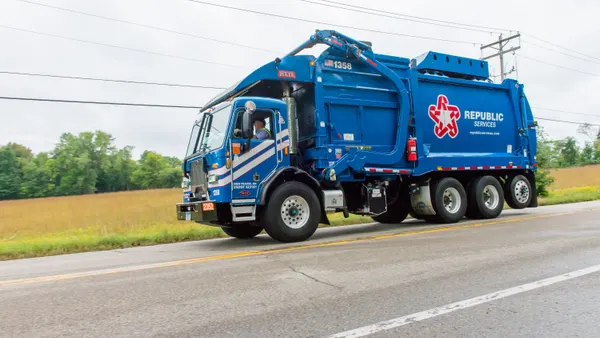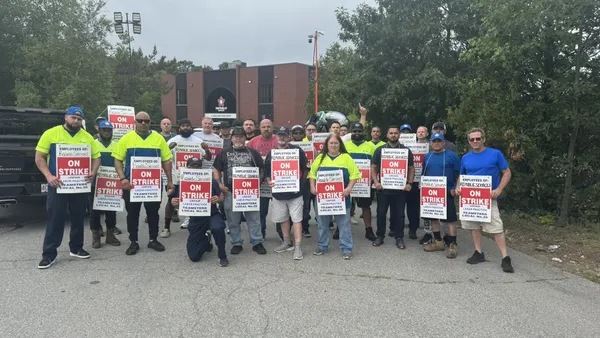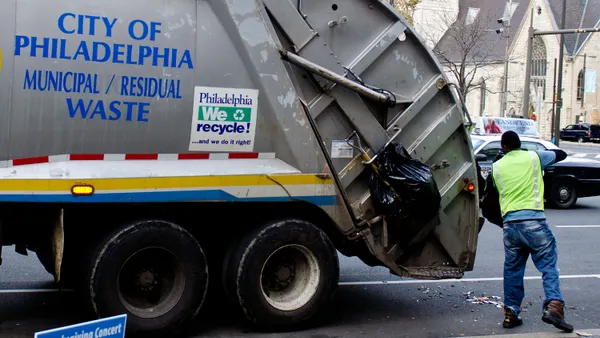UPDATE: July 10, 2019: Loop recently announced that its reusable packaging service is now available in five more Northeastern states – Connecticut, Delaware, Massachusetts, Rhode Island and Vermont – for a total of eight, plus Washington, D.C. Since launching this spring, the TerraCycle-backed concept has attracted more than 40 participating brands.
Dive Brief:
- Loop, the "circular shopping platform" developed by recycling company TerraCycle, launched its e-commerce site this week and announced Kroger and Walgreens as founding retail partners at a press conference in New York.
- The list of vendors that have now developed multi-use packaging designed to be purchased, returned (via UPS), cleaned, refilled and resold has grown to roughly 25. That includes founding vendors Unilever, Mars, Nestle and PepsiCo, as well as new additions Colgate-Palmolive and Procter & Gamble. Products currently listed on the Loop site require a $1 to $5 deposit for the package. Users will send packaging back to Loop to be cleaned via a partnership with UPS.
- Shoppers in some New Jersey, New York, Pennsylvania, Maryland and Washington D.C. zip codes can sign up for a limited number of available "places" in the program; a pilot has also been launched in Paris, France. The message upon signing up reads: "Due to extremely high demand for participation and the limited space, we are accepting new users on a rolling basis." More cities are on the way, according to the message.
Dive Insight:
Loop aims to make it as easy as possible for consumers to use the same products they already buy — all while producing drastically less waste. Perhaps even more significant than the change in consumer behavior is the operational and cultural shift required of Loop's corporate partners.
During the press conference, TerraCycle CEO Tom Szaky remarked at how rare it is to have executives from rivals Unilever and Nestle sharing the stage. Executives described Loop's e-commerce site as a grand experiment, with vendors sharing learnings as the pilot progresses.
"The key thing here in the pilot is to really understand how sustainable [it is]. I think we’re really trying to test and learn the customer reactions, and certainly the reason at Walgreens we wanted to get involved as well is that, quite honestly, customers are demanding this from us," said Lauren Brindley, group vice president for beauty and personal care for Walgreens, whose website now features a link directing shoppers to the Loop site.
While Walgreens and Kroger plan to eventually carry Loop products in store, that outcome isn't guaranteed and remains far in the distance as customers begin to test the program and give vendors a sense of the operational burden.
The question of net sustainability is a big one for the players involved. The program is reducing single-use packaging by requiring that products be packaged largely in glass or stainless steel containers that can be cleaned and reused at least 10 times — but ideally 100 times —according to Szaky.
The TerraCycle CEO said all vendors are equipped with technology to perform and track "lifecycle analysis" on carbon emissions and air and water quality impacts, along with the performance of the packaging each vendor has landed on for this pilot stage.
"Reusable packaging is more expensive from an environmental perspective to make the first time … but every time it goes around, you don't have the cost of remaking it. All you do is have the cost of collecting it and cleaning it. And by using really efficient supply chains to do the collection, it's very efficient to transport," said Szaky.
Large corporations don't like to experiment publicly, so the admission that this first try might not produce the winning packaging or operational model might be taken as a sign of commitment to finding a way for the platform to work.
"From a P&G standpoint, we are looking at packages that are made out of stainless, packages made out of glass, packages made out of plastics … I don't know which one is going to resonate the best, but we're going to explore many alternatives, and we're going to learn through this," said Carolyn Tastad, group president for North America at P&G. "We are all committed and we will make it work, but we have to learn our way through that."
Most brands are offering a limited product array, which contains the pilot's operational impact. PepsiCo will start with one product.
"Right now, it's a pilot, so we're only doing it on Tropicana for now ... On that one, we'll have a production facility near that allows us to do that. And as we expand the program, we'll have to re-look at that," Patrick Kalotis, senior vice president and general manager of juice at PepsiCo, told Supply Chain Dive.
Expansion is key for Loop, which Kalotis described as playing the role of the "milkman" in this delivery scenario. As Szaky noted, "Without this growing and being meaningful in scale, it's not much more than some great publicity."











